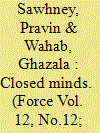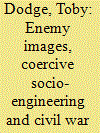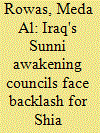| Srl | Item |
| 1 |
ID:
139755


|
|
|
|
|
| Summary/Abstract |
Srinagar: As dusk settled in, the call of the muezzin broke through the cacophony of the traffic and surge of people rushing to reach a place where they could break their daily fast. On the bustling streets of Residency Road leading up to the famous (or notorious, depending upon one’s perspective and memories) Lal Chowk, men, and sometimes boys, stood on the pavement with trays of milky drinks and dates for the passing rozgaars (those who were on the fast) who were unlikely to reach their home or a mosque in time.
|
|
|
|
|
|
|
|
|
|
|
|
|
|
|
|
| 2 |
ID:
115322


|
|
|
|
|
| Publication |
2012.
|
| Summary/Abstract |
Previous attempts to explain US policy towards Iraq from 2003 onwards have understood US intentions and actions through a coherent, rational-utility-maximizing model of the state. This article seeks to de-centre this rationalist explanation by examining the ideational drivers that shaped the Bush administration's understanding of Iraq and hence its policy towards the remaking of its post-invasion politics. In order to gain ideational coherence, both the Iraqi Ba'ath Party and the Sunni community were understood through a 'diabolical enemy image' schema. As a consequence, an 'exclusive elite pact' was constructed, a post-war political system specifically built to exclude former members of the Ba'ath Party and marginalize the participation of the Sunni community. This policy of exclusion drove the country into civil war. One side, Iraq's new ruling elite, fought to impose a victor's peace, the violent suppression of former members of the old regime. On the other, those excluded launched an insurgency to overturn the post-war political order.
|
|
|
|
|
|
|
|
|
|
|
|
|
|
|
|
| 3 |
ID:
129241


|
|
|
| 4 |
ID:
129140


|
|
|
| 5 |
ID:
113627


|
|
|
| 6 |
ID:
091054


|
|
|
|
|
| Publication |
2009.
|
| Summary/Abstract |
I m going to go through fairly briefly the risks associated with leaving Iraq, and then some strategies to reduce those risks.This will be a good introduction to several of my colleagues here who will be going into more detail on some of these specific risk factors.The categories that I will talk about are, first of all, logistical risks; second, risks associated with al-Qaeda and terrorist groups; third, risks associated with the major Iraqi groups;and fourth, risks associated with the neighboring countries.
|
|
|
|
|
|
|
|
|
|
|
|
|
|
|
|